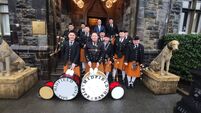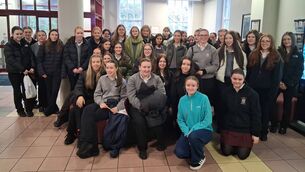Local notes: 'Great Place to Work' award for Sligo Park Hotel

Sligo Park Hotel has won certification from the globally prestigious ‘Great Place to Work' Program, which recognises organisational and employer excellence, for the second year running.
Sligo Park Hotel has won certification from the globally prestigious ‘Great Place to Work' Program, which recognises organisational and employer excellence, for the second year running. General Manager and Director, Gerard Moore said the GPTW award was an achievement celebrated by all at Sligo Park Hotel. He said:
“Another award like this demonstrates what we have been doing and emphasises our commitment as a workplace that values talent and our continuous journey for improvement. We continually strive to improve and sustain a great workplace culture, and to have our efforts officially recognised through our recent certification as a ‘Great Place to Work’ is a major achievement."
On Tuesday, November 30, Sandy Cuffe of Quarryfield, Bunanndden, passed to his eternal reward at Bailey’s Nursing Home, Tubbercurry, Co Sligo. He was predeceased by his sister Muriel and is survived by his sister Sylvia, brother Cyril, sister-in-law Dee, nieces and nephews, grandchildren and a large circle of friends. He had lived a long happy carefree life, reached the ripe old age of 98, enjoying every minute of it.
Many will remember him as a shop assistant in former days in Tubbercurry. He was kind and courteous, easy to deal with, light hearted, living for the moment. He loved the town life where he danced on Saturday nights, and listened to local bands and talent. Everyone knew Sandy, a genial soul, happy in his environment, a man to all the country dear.
He was tall and elegant and could be seen in his tall peaked cap, head and shoulders above the crowd. His little house in Quarryfield was known far and wide and all were welcome. Cars and bikes were parked there from morning to night.
In his retirement he was never on his own. After a few steps visitors were in his kitchen seated in a comfortable chair. He kept a tidy house with many photographs of the past all of which he treasured. There was always a good turf fire burning in the hearth and visitors rambled where they listened to his words of wisdom. Children accompanied with their mothers for a walk were more than welcome. He knew them by name and always had a few biscuits or a bar of chocolate at the ready. Thus he spent the later years of his life among neighbours and friends.
He had great interest in folklore and history and an hour or two spent in his company was well spent. His passing has left a great breach in community and we will not see his likes again. However he has left fond memories and shown the way how to go through life. We miss you Sandy.
Sandy’s remains reposed at Coen’s Funeral home on December 1, from 5 to 7pm and then on Saturday, December 2, his funeral service took place in St. George’s at 1pm and his funeral followed to Rhue Cemetery where he was laid to rest. May he rest in peace.
It was a cold bleak morning on the first of December. There was a heavy nights frost and Peter, a farmer had a hard days work ahead of him. He hadn’t been well for a long time and was late in finishing digging the potatoes. He had three or four ridges yet to dig and he was looking forward to the hour when the last of them would be pitted. Trouble was there was little or no help. The war was on in Europe and the young men had emigrated to the US or England, and so he had to rely on himself. Not withstanding all this on his mind he put the pan on the coals, fried a few rashers and two eggs, wet the tea, cut a few slices of soda bread and had a good hearty breakfast.
Before leaving he tidied up put on a good heavy coat and ventured out. Going to the barn for the spade he saw the icicles hang from the galvanize and he knew he was in for a hard day, so collecting the spade and basket for picking he put the latch back on the barn door and headed down the road to the field. Then coming round the corner towards him he saw hope, as he thought. It was the Bacach Mor, a journey man out early in the countryside with an eye on getting something for nothing. A thought flashed into Peter’s head and as they came level so he said ‘Good morning Bacach, you are out early, I expect you are looking for work’. ‘Not at all’, said Bacach. ‘I am looking for charity, a poor starved man like me cannot work’. ‘Well’, said Peter ‘I will give you a half a crown if you will come for the day and pick potatoes’. A half a crown in those days as wages was considered good money. ‘No’, said the Bacach ‘An empty sack cannot stand’. ‘What do you mean?’ asked Peter. ‘Well, it’s like this’, replied Bacach ‘I am hungry, I cannot work on an empty stomach’. Peter thought for a moment and then said ‘Well come back to the house and I will make you a good breakfast and then you can come with me to the field and still earn the half crown’. So back the pair went. Peter put more turf on the fire raked out more coals under the pan, and put on a few rashers, and a duck egg, wet tea and cut two farrels of soda cake and put the lot on a plate before Bacach. The Bacach set to eating and when he had finished Peter said ‘Well now it’s getting on and time to go to the field so setting off down the road Peter had only gone a few steps when he noticed there was no sound of the Bacach and on turning round he noticed that the Bacach was going off in the opposite direction. ‘Where are you going?’ shouted Peter, ‘I thought you said an empty sack couldn’t stand’. The Bacach answered back ‘Yes indeed I did, it is so true, but you know too that a full sack cannot bend’, and so with that he continued on his way. It just was not Peter’s Day.
It is hard to believe but there was a time when the guinea hen or fowl was judged as a very important asset by farmers’ wives. Back in the last century rearing of ducks, geese and turkeys for the Christmas market was widespread across the country. Hundreds of thousands of turkeys were raised in the farmyards for Christmas export to England. The birds were fed healthy organic food as crushed oats, mashed potatoes, and milk three time daily, and by the first week of Christmas their presence was noticeable as they strutted and gurgled round the farmyards. It took a lot of food and constant care to get them to that stage and all was not profit.
Then one Christmas in the early forties a new small bird, a tenth in size and weight of the turkey made its appearance on the markets. It was the guinea fowl. Now this bird was believed to have come originally from North Africa and to this day nobody still knows. It was wild and hard to domesticate. It preferred to roost in the bushes, at night, lay outside in fences, and hatch there. It was hard to tell the difference between a cock and hen. The guinea fowl created a horrid din, and the day before it rained it went round the haggard making a raucous noise as gawk - gawk.
Despite all this they still became very popular and this small bird could fetch one pound and one shilling each, the same money as a twenty pound cock turkey. Over a short period they became very numerous and some housewives gave up rearing turkeys in their favour. Collecting them for sale had to take place under the cover of darkness as in the day time when approached they took flight if they sensed any danger of being trapped. Once in custody the seller had to be doubly careful for if the birds spotted light they took to wing and flew off and perched high up on telephone poles in the market place. Buyers too found them difficult to manage. Byand by the Christmas markets died away and with them went the guinea fowl.
Cloonacool Players are celebrating after a successful All-Ireland 1-Act Festival. Their entry was awarded 1st place at Manorhamilton, plus Best Actor award for Martin McIntyre. In previous weeks at other festivals they gained a 2nd and two 3rd places. The players are back in action and thank all the audiences for their support and enthusiasm, and wish everyone a Happy Christmas.
*********************
Carrentemple Cemetery Committee thank everyone who contributed to the collection for the maintenance and improvements for the cemetery. A total of €1,145 was collected on the day the November prayers for the dead were recited. Well done to all concerned.
The Eastern Harps 50/50 draw on Monday night with a jackpot of €536 was won by Pat and Marguerite McGovern, Mount Irwin, Gurteen. The club is very appreciative of all the support.
There was no winner of the jackpot of €6,700 on Sunday night, November 26 and the numbers drawn were 1, 4, 12, and 18. The winner of the €50 was Ann and Bella O'Dowd, Gurteen. The latest jackpot in the draw which was held on Sunday night, December 3, in The Dapper Duck, Gurteen, was €6,800. The club are most appreciative of all support.
If anyone wishes to receive their silver or gold pioneer pin or become a member of the Achonry Pioneer Association contact Thomas at 087 2344338 or to achonrypioneers@gmail.com before December 31.





